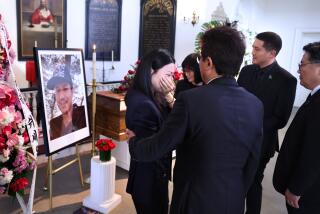How Spiral Into Depression Brought Tragedy to Family : Violence: Fear that his mental illness was hereditary led man to kill his two young sons, police and relatives say.
- Share via
Bobby Blahnik’s fall began around the spring.
It started at work, where the 34-year-old crane mechanic from Long Beach felt harassed and unsure of himself. The depression grew to the point where Blahnik turned to psychologists, psychiatrists and Prozac. And when he couldn’t shake his despair, he began reading medical books for answers.
Now, it seems, the only thing Blahnik’s search did was drive him deeper into darkness. For at some awful point, police and family now say, Blahnik concluded that his depression was hereditary and he could not bear the idea that he had passed it on to his sons. So on a sunny Sunday afternoon two weeks ago, Blahnik left a family gathering at his parents’ house in San Pedro and took his two oldest boys, Ryan, 6, and Michael, 4, to a rocky beach in San Pedro.
And there, authorities say, he shot them in order to save them.
“He felt he was handed some bad genes . . . and near the end there, I believe it was even in his confession, he felt his boys shouldn’t go through life as sick and depressed as he was,” Blahnik’s father, Frank, said in an interview.
Added LAPD homicide Detective Gary Guevara: “He felt that he was mentally ill. And he felt that it was hereditary.”
As authorities wait for Blahnik to fully recover from a suicide attempt so he can stand trial on charges of murder that could lead to the death penalty, Los Angeles police and Blahnik’s father offered the first glimpse last week into what might have motivated the once-cheery family man to allegedly kill the boys he adored before shooting himself in the head.
“I can almost understand that he could do it to himself,” his father said. “But to take the children with him--what was he thinking?
“Because I know he loved his boys. Hell, I would go over to see him and light up a cigarette and he would run me outside because he didn’t want me smoking in front of ‘em.”
While some details of the Aug. 13 shooting remain unknown, interviews with authorities and Frank Blahnik offered new insight into the family tragedy and events leading to it.
For one thing, it appears that Blahnik’s suicide attempt was foiled only by fate and not a lack of will.
After mortally wounding his sons with a two-shot Derringer, Blahnik then reloaded the pistol and aimed its barrel just below his right ear. But the bullet wound, though serious, was not fatal and Blahnik dropped the weapon into the surf before he could fire another round.
“He realized what had happened and was . . . so stunned,” his father said, in an account confirmed by authorities. “He just wanted to finish it off. He begged the police to shoot him. And naturally they wouldn’t. And he begged the paramedics to let him die. And naturally they wouldn’t.”
At the scene of the killings, authorities said, they found a long letter that underscored Blahnik’s distress, but they would not divulge its contents.
Despite Blahnik’s depression, Detective Guevara said he gave no hint he would take such a drastic step. He apparently made no move to settle his financial affairs to provide for his wife, Elizabeth, and surviving infant son, Kevin. “There was no finalization in his life,” Guevara said.
“Nor,” the detective added, “did he give any indication to anyone in his family that anything like this would occur.”
Still, looking back, Frank Blahnik said, it now seems obvious that his son’s spiral into depression long ago reached a crisis.
“There were no financial or marital problems. But he was having problems where he worked . . . and evidently he got into a depression,” Frank Blahnik said.
Exactly what was happening at work is unclear.
After six years on the job, Blahnik recently left the night shift where, he told some family and friends, he was having a conflict with one co-worker.
“The first time he came back to days, I noticed right away he was not the same guy. He was like in a shell,” said one friend, who spoke on condition of anonymity. “He had lots of doubts about his own ability. I kept telling him he was fine. But he had this thing in his mind that everybody was out to get him.”
The docks are no place for the faint of heart and Blahnik, known to friends and co-workers as sensitive and conscientious, took the conflict with his co-worker harder than most.
“There was some definite friction, yes,” said the friend. “But there is always going to be that in any work . . . it was just a clash of personalities.”
Still, it gnawed at Blahnik in a way that no one could believe. “A year ago, he could handle conflict . . . he just wasn’t the same guy,” said the friend.
For the past several months, Frank Blahnik said, his son was under the care of doctors for his depression. “He was still under their care” at the time of the shooting, he said, declining to identify the therapists and physicians who were treating his son.
“You would look at him one day and he would seem to be pretty good. And the next day, he would be depressed and downtrodden,” the father said.
Frustrated that medical attention and medication could not shake his despair, Bobby Blahnik set out to, if not cure himself, at least understand his illness, his father said.
“He was reading all these books about mental illness and depression. He was trying to figure out what the hell was the matter with him,” said Frank Blahnik.
At some point, Bobby Blahnik, interpreting his readings through the warp of depression, reached the conclusion that the problem was hereditary--a notion his family and friends unsuccessfully tried to challenge.
“I found that if we agreed with what he said, he’d be OK,” Frank Blahnik said. “But if we started disagreeing with him, to tell him that he was imagining things, he would go off into another world . . . almost like if I was talking with him on the phone and he would put it down and walk away.
“The whole family really feels that his psychologists and psychiatrists let him down and let us down, too,” Blahnik said. “If they would have told us that he should have been hospitalized, that he was this ill, we would have done something.”
The family is still waiting to speak to Bobby when he is moved to the jail ward at County-USC Medical Center. Perhaps, they think, a talk will help them understand the tragedy they cannot comprehend and accept events they cannot reverse.
“They were angry at the beginning,” Frank Blahnik said. “But I can’t find anyone in the family who doesn’t now love him, who doesn’t feel sorry for him.”
More to Read
Sign up for Essential California
The most important California stories and recommendations in your inbox every morning.
You may occasionally receive promotional content from the Los Angeles Times.













